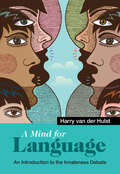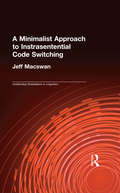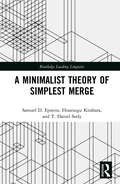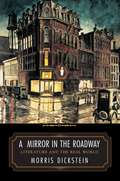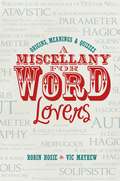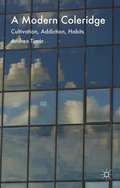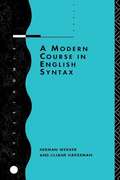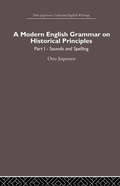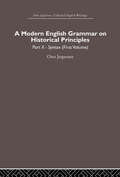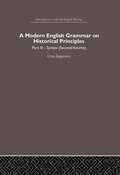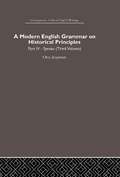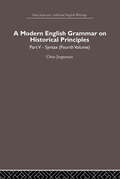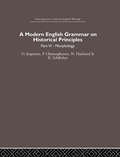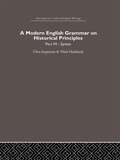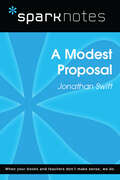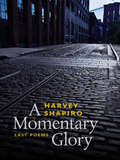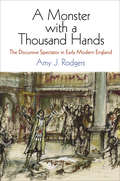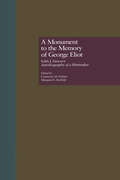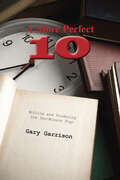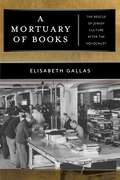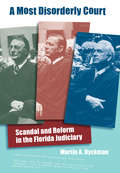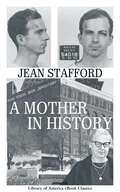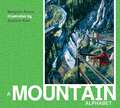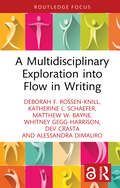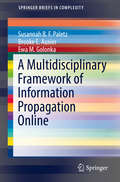- Table View
- List View
A Minimalist Approach to Intrasentential Code Switching (Outstanding Dissertations in Linguistics)
by Jeff MacSwanFirst Published in 1999. Code switching is widely used in bilingual communities worldwide, and has been found in government documents, literature, religious works, and song. Pursuing this aim here, chapter 1 addresses the relevance of the study of code switching for education and schooling, focusing on ways in which a misunderstanding of code switching may lead to tacit tracking effects for language-minority children.
A Minimalist Theory of Simplest Merge (Routledge Leading Linguists)
by Samuel D. Epstein Hisatsugu Kitahara T. Daniel SeelyThis collection explicates one of the core ideas underpinning Minimalist theory – explanation via simplification – and its role in shaping some of the latest developments within this framework, specifically the simplest Merge hypothesis and the reduction of syntactic phenomena to third factor considerations. Bringing together recent papers on the topic by Epstein, Kitahara, and Seely, with one by Epstein, Seely and Obata, and one by Kitahara, the book begins with an introduction which situates the papers in a cohesive overview of some of the latest research on Minimalism, as facilitated by current theoretical developments. The volume integrates a historical overview of evolutions in Merge, starting with Chomsky’s (pre-Merge) Aspects model up to current theoretical models, including a primer of Chomsky’s most recent theory of Merge based on the concept of Workspace. The Minimalist notions of "perfection" and "simplification" are also outlined, providing clearly explicated coverage of key technical concepts within the framework as applied to grammatical phenomena. Taken as a whole, the collection both introduces and advances Minimalist theory for students and scholars in linguistics and related sub-disciplines of psychology, philosophy, and cognitive science, as well as offering new directions for future research for researchers in these fields.
A Mirror in the Roadway: Literature and the Real World
by Morris DicksteinIn a famous passage in The Red and the Black, the French writer Stendhal described the novel as a mirror being carried along a roadway. In the twentieth century this was derided as a naïve notion of realism. Instead, modern writers experimented with creative forms of invention and dislocation. Deconstructive theorists went even further, questioning whether literature had any real reference to a world outside its own language, while traditional historians challenged whether novels gave a trustworthy representation of history and society.In this book, Morris Dickstein reinterprets Stendhal's metaphor and tracks the different worlds of a wide array of twentieth-century writers, from realists like Theodore Dreiser, Sinclair Lewis, Edith Wharton, and Willa Cather, through modernists like Franz Kafka and Samuel Beckett, to wildly inventive postwar writers like Saul Bellow, Günter Grass, Mary McCarthy, George Orwell, Philip Roth, and Gabriel García Márquez. Dickstein argues that fiction will always yield rich insight into its subject, and that literature can also be a form of historical understanding. Writers refract the world through their forms and sensibilities. He shows how the work of these writers recaptures--yet also transforms--the life around them, the world inside them, and the universe of language and feeling they share with their readers.Through lively and incisive essays directed to general readers as well as students of literature, Dickstein redefines the literary landscape--a landscape in which reading has for decades been devalued by society and distorted by theory. Having begun with a reconsideration of realism, the book concludes with several essays probing the strengths and limitations of a historical approach to literature and criticism.
A Miscellany for Word Lovers: Origins, Meanings & Quizzes
by Robin Hosie Vic MayhewMore than 100 vocabulary-building quizzes make up the core of the book, with shorter sections on: * The fascinating origins of words * Quotes and misquotes* Slang, dialects and secret languages * Unforgettable Adverts, Famous Lines from Novels and Movies* Newspeak, Basic English, spelling reform* Malapropisms, politicians' blunders and 'mispeakings'* Mnemonics and other memory joggers* Palindromes and anagrams * Semaphore. Morse, tic-tac, hand gestures and other ways of speaking without wordsEntry after entry explores the byways, oddities and curiosities of the English language.
A Modern Coleridge
by Andrea TimárA Modern Coleridge shows the interrelatedness of the discourses of cultivation, addiction and habit in Coleridge's poetry and prose, and argues that these all revolve around the problematic nexus of a post-Kantian idea of free will, essential to Coleridge's eminently modern idea of the 'human'.
A Modern Course in English Syntax
by Liliane Haegeman Herman WekkerThis popular course book gives students of English and linguistics a systematic account of the rules of English syntax, and acquaints them with the general methodology of syntactic description. It teaches them how to formulate syntactic arguments, and how to apply the tests in the analysis of sentences.
A Modern English Grammar on Historical Principles: Volume 1, Sounds and Spellings
by Otto JespersenThis book was first published in 1954, A Modern English Grammar on Historical Principles is a valuable contribution to the field of English Grammar and Linguistics.
A Modern English Grammar on Historical Principles: Volume 2, Syntax (first volume)
by Otto JespersenThis book was first published in 1954, A Modern English Grammar on Historical Principles is a valuable contribution to the field of English Language and Linguistics.
A Modern English Grammar on Historical Principles: Volume 3
by Otto JespersenThis book was first published in 1954, A Modern English Grammar on Historical Principles is a valuable contribution to the field of English Grammar and Linguistics.
A Modern English Grammar on Historical Principles: Volume 4. Syntax (third volume)
by Otto JespersenThis book was first published in 1954, A Modern English Grammar on Historical Principles is a valuable contribution to the field of English Language and Linguistics.
A Modern English Grammar on Historical Principles: Volume 5, Syntax (fourth volume)
by Otto JespersenThis book was first published in 1954, A Modern English Grammar on Historical Principles is a valuable contribution to the field of English Language and Linguistics.
A Modern English Grammar on Historical Principles: Volume 6
by Otto Jespersen Niels Haislund Knud Schibsbye Paul ChristophersenIn Morphology the first thing to be considered is the form, and second to that comes the use made of it, in Syntax the order is exactly the reverse, but it is essential that in both parts of the grammar form and use should be mentioned in every case. Volume 6 looks at English Morphology including subjects such as personal endings in verbs, tense formation in verbs, the naked word, compounds, change of vowels, suffixes, and the endings s, st and n, to name a few.
A Modern English Grammar on Historical Principles: Volume 7. Syntax
by Otto JespersenThis book is the seventh and last volume of that great work by Otto Jespersen the first volume of which was published in 1909. This volume looks at English Syntax including subjects such as sentence structure, word classes, word order, cases, comparison and determination.
A Modest Proposal (SparkNotes Literature Guide Series)
by SparkNotesA Modest Proposal (SparkNotes Literature Guide) by Jonathan Swift Making the reading experience fun! Created by Harvard students for students everywhere, SparkNotes is a new breed of study guide: smarter, better, faster. Geared to what today's students need to know, SparkNotes provides: *Chapter-by-chapter analysis *Explanations of key themes, motifs, and symbols *A review quiz and essay topicsLively and accessible, these guides are perfect for late-night studying and writing papers
A Momentary Glory: Last Poems (Wesleyan Poetry Series)
by Harvey ShapiroThe passionate testament of a brilliant poet in the face of age, illness, and mortality The distinguished poet Harvey Shapiro passed away on January 7, 2013. The poems in this book, many of them previously unpublished and discovered only after his death, are a great gift, and the final confirmation of his extraordinary talent. Edited by Shapiro's literary executor, the poet and critic Norman Finkelstein, these last poems bear an unprecedented gravitas, and yet they are as supple, jazzy, and edgy as Shapiro's earlier work. All the themes for which he is known are beautifully represented here. There are poems of his experiences in World War II, the erotic life, and of daily moments in Brooklyn and Manhattan, all in search of a worldly wisdom and grace that the poet calls "a momentary glory." As Shapiro tells us, the poem "Is an Egyptian / ship of the dead, / everything required / for life stored / in its hold." The book includes an introduction by the editor.
A Monster with a Thousand Hands: The Discursive Spectator in Early Modern England
by Amy J. RodgersA Monster with a Thousand Hands makes visible a figure that has been largely overlooked in early modern scholarship on theater and audiences: the discursive spectator, an entity distinct from the actual bodies attending early modern English playhouses. Amy J. Rodgers demonstrates how the English commercial theater's rapid development and prosperity altered the lexicon for describing theatergoers and the processes of engagement that the theater was believed to cultivate. In turn, these changes influenced and produced a cultural projection—the spectator—a figure generated by social practices rather than a faithful recording of those who attended the theater. The early modern discursive spectator did not merely develop alongside the phenomenological one, but played as significant a role in shaping early modern viewers and viewing practices as did changes to staging technologies, exhibition practices, and generic experimentation.While audience and film studies have theorized the spectator, these fields tend to focus on the role of twentieth-century media (film, television, and the computer) in producing mass-culture viewers. Such emphases lead to a misapprehension that the discursive spectator is modernity's creature. Fearing anachronism, early modern scholars have preferred demographic studies of audiences to theoretical engagements with the "effects" of spectatorship. While demographic work provides an invaluable snapshot, it cannot account for the ways that the spectator is as much an idea as a material presence. And, while a few studies pursue the dynamics that existed among author, text, and audience using critical tools sharpened by film studies, they tend to obscure how early modern culture understood the spectator. Rather than relying exclusively on historical or theoretical methodologies, A Monster with a Thousand Hands reframes spectatorship as a subject of inquiry shaped both by changes in entertainment technologies and the interaction of groups and individuals with different forms of cultural production.
A Monument to the Memory of George Eliot: Edith J. Simcox's Autobiography of a Shirtmaker (Literature and Society in Victorian Britain #Vol. 4)
by Constance M. Fulmer Margaret E. BarfieldFirst published in 1998. Routledge is an imprint of Taylor & Francis, an informa company.
A More Perfect Ten: Writing and Producing the Ten-Minute Play
by Gary GarrisonA More Perfect Ten is a revision of Gary Garrison's pioneering book on writing and producing the 10-minute play, and it is now the most authoritative book on this emerging play form. The 10-minute play has become a regular feature of theatre companies and festivals from coast to coast, and Garrison has distilled the advice of many of those people who had been instrumental in promoting the ten minute play for the last few years.Replete with advice and tips on creating the successful 10-minute play, and cautions for avoiding the pitfalls, this new edition also includes addresses for the biggest and most important 10-minute festival opportunities, new sample 10-minute plays and questions for thought and discussion, and sample layout templates for laying out the play for submission. The savvy playwright at any level of skill can use this little book to great advantage. Plus Gary Garrison is warm, funny, irreverent, and essential.
A Mortuary of Books: The Rescue of Jewish Culture after the Holocaust (Goldstein-Goren Series in American Jewish History #17)
by Elisabeth GallasWinner, 2020 JDC-Herbert Katzki Award for Writing Based on Archival Material, given by the Jewish Book CouncilThe astonishing story of the efforts of scholars and activists to rescue Jewish cultural treasures after the HolocaustIn March 1946 the American Military Government for Germany established the Offenbach Archival Depot near Frankfurt to store, identify, and restore the huge quantities of Nazi-looted books, archival material, and ritual objects that Army members had found hidden in German caches. These items bore testimony to the cultural genocide that accompanied the Nazis’ systematic acts of mass murder. The depot built a short-lived lieu de memoire—a “mortuary of books,” as the later renowned historian Lucy Dawidowicz called it—with over three million books of Jewish origin coming from nineteen different European countries awaiting restitution. A Mortuary of Books tells the miraculous story of the many Jewish organizations and individuals who, after the war, sought to recover this looted cultural property and return the millions of treasured objects to their rightful owners. Some of the most outstanding Jewish intellectuals of the twentieth century, including Dawidowicz, Hannah Arendt, Salo W. Baron, and Gershom Scholem, were involved in this herculean effort. This led to the creation of Jewish Cultural Reconstruction Inc., an international body that acted as the Jewish trustee for heirless property in the American Zone and transferred hundreds of thousands of objects from the Depot to the new centers of Jewish life after the Holocaust. The commitment of these individuals to the restitution of cultural property revealed the importance of cultural objects as symbols of the enduring legacy of those who could not be saved. It also fostered Jewish culture and scholarly life in the postwar world.
A Most Disorderly Court: Scandal and Reform in the Florida Judiciary (Florida History and Culture)
by Martin A. DyckmanIn the 1970s, justices on the Florida Supreme Court were popularly elected. But a number of scandals threatened to topple the court until public outrage led to profound reforms and fundamental changes in the way justices were seated.One justice abruptly retired after being filmed on a high-roller junket to Las Vegas. Two others tried to fix cases in lower courts on behalf of campaign supporters. A fourth destroyed evidence by shredding his copy of a document into "seventeen equal" strips of paper that he then flushed down a toilet.As the journalist who wrote most of the stories that exposed these events, Martin Dyckman played a key role in revealing the corruption, favoritism, and cronyism then rampant in the court.A Most Disorderly Court recounts this dark period in Florida politics, when stunning revelations regularly came to light. He also traces the reform efforts that ultimately led to a constitutional amendment providing for the appointment of all Florida's appellate judges, and emphasizes the absolute importance of confidential sources for journalists.
A Mother in History
by Jean StaffordJean Stafford's unforgettable portrait of Marguerite Oswald, the mother of Lee Harvey Oswald.Curious about &“the influences and accidents and loves and antipathies and idiosyncrasies&” that shaped Lee Harvey Oswald, the novelist and short story writer Jean Stafford spent nine hours interviewing Marguerite Oswald in May 1965. A Mother in History (1966) is the acerbic result, an indelible portrait of a woman hungry for money, fame, and attention, full of righteous self-pity, and relentless in professing her son&’s blamelessness: &“Killing does not necessarily mean badness. You find killing in some very fine homes for one reason or another.&” Stafford&’s controversial profile elicited mixed reviews—Newsweek praised it as a &“masterpiece of character study,&” while Time called it &“the most abrasively unpleasant book in recent years&”—and angry readers accused her of seeking to &“enthrone a wicked woman&” and &“demolish the sacred throne of motherhood.&” It captures a moment in history when the trauma of Dallas was still raw, Lee Harvey Oswald&’s guilt was widely accepted, and Marguerite Oswald, with her obsessive &“research&” into hidden &“truths&” and the machinations of an omnipresent &“they,&” appeared to be a singular prisoner of maternal delusion, and not a harbinger of the decades to come.
A Mountain Alphabet (ABC Our Country)
by Margriet RuursMountains are an impressive sight anywhere in the world but those of the western mountain region of North America offer riches that are truly unique. This lavishly illustrated picture book presents snowcapped peaks, emerald lakes, tall pines and magnificent maples, and a range of birds and animals that will fill readers of all ages with wonder.The treasures and mysteries of nature are depicted in twenty-six full-color paintings, each with a line of alliterative text. Objects that begin with that letter of the alphabet are waiting to be discovered in each illustration. Complete with detailed information about each setting painted, this is a visually and mentally stimulating experience – from A to Z.
A Multidisciplinary Exploration into Flow in Writing (Routledge Research in Writing Studies)
by Deborah F. Rossen-Knill Katherine L. Schaefer Matthew W. Bayne Whitney Gegg-Harrison Dev Crasta Alessandra DiMauroOffering a multidisciplinary exploration of “flow” and the often-nebulous ways it is conceptualized and operationalized in writing pedagogy, this book addresses a critical gap in writing studies.Bringing together practice-based and scholarly perceptions, it outlines the key features and definitions of flow, and identifies pedagogical approaches and opportunities for classroom instruction. Incorporating perspectives from disciplines including classical rhetoric, composition studies, cognitive science, and linguistics, this book provides a diverse overview of the literature on flow in writing pedagogy. It includes two instructional voice-based and rhetorical grammar-based activities that outline how to recognize and improve flow in writing. In doing so, the book also provides clear examples of how to create an inclusive writing pedagogy that incorporates sensory and analytical perspectives to help readers and writers experience flow and meet their writing goals.As an exploration of flow instruction as it currently stands and might stand in the future, this book will be of interest to students and instructors in the field of academic, professional and creative writing studies.The Open Access version of this book, available at www.taylorfrancis.com, has been made available under a Creative Commons Attribution-Non Commercial-No Derivatives (CC-BY-NC-ND) 4.0 license.
A Multidisciplinary Framework of Information Propagation Online (SpringerBriefs in Complexity)
by Susannah B. Paletz Brooke E. Auxier Ewa M. GolonkaThis book presents a broad, multidisciplinary review of the factors that have been shown to or might influence sharing information on social media, regardless of its veracity. Drawing on literature from psychology, sociology, political science, communication, and information studies, the book provides a high-level framework of information sharing. The framework progresses through different categories. Information is first acquired or viewed from different sources; then, the target sharer has emotional and cognitive reactions to that information. The next categories involve motivations to share and the actual ability and perceptions of that ability to share. The greater context, such as culture, language, and social networks, also influences information sharing. Finally, the book distinguishes between genuine and non-genuine (inauthentic) actors. This text will appeal to students and especially to technical researchers looking for a social science perspective.
